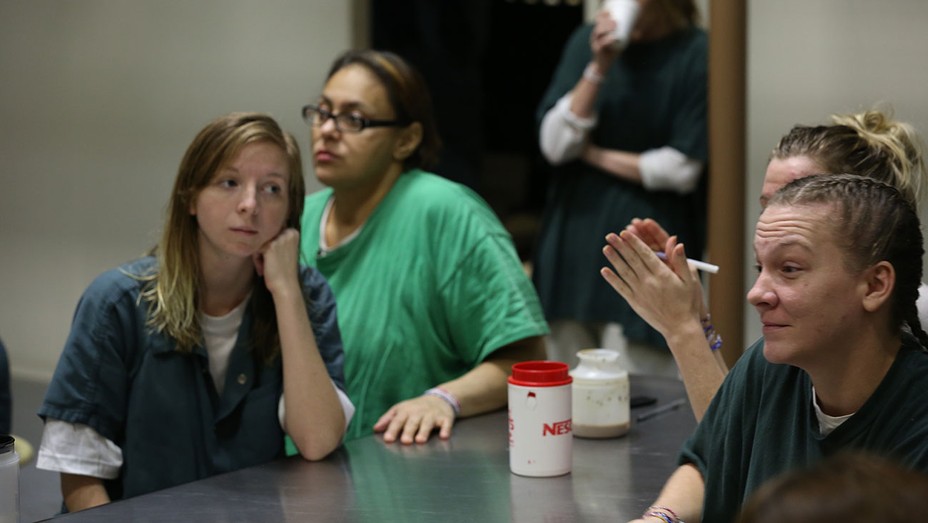60 Days In: Do Contestants Get Paid? The Truth Revealed! 🔥
Ever wondered what it takes to willingly enter a county jail, trading your freedom for sixty days of uncertainty? The A&E reality show, "60 Days In," offers just that, but the question on everyone's mind isn't about the experience itself, but rather the compensation: how much do 60 days in participants get paid?
The series, known for its daring premise of sending ordinary citizens undercover into correctional facilities, has captivated audiences with its raw portrayal of prison life. Participants, carefully selected and often assigned specific missions by the local sheriff, embark on a social experiment designed to expose flaws within the system. The initial allure of "60 Days In" lies in its seemingly simple premise: infiltrate a prison, observe, and report. However, the reality for these individuals is far from simple. They face genuine risks and psychological challenges as they navigate the complex and often dangerous environment behind bars.
| Category | Details |
|---|---|
| Show Premise | Undercover investigation of prison facilities. |
| Typical Participant | Volunteers with diverse backgrounds and motivations. |
| Filming Location | Various county jails across the United States. |
| A&E's Stated Goal | To expose the realities of the prison system. |
| Duration of Participation | Approximately 60 days. |
| Known Payment to Facilities | Example: $60,000 paid to the Clark County Jail. |
| Estimated A&E Show Budget (per episode) | Around $375,000. |
| Typical Weekly Stipend | Believed to be around $1,000. |
| Alternative Payment View | Cast Salary per Show at around $3,000. |
| Reference Website | A&E Networks Official Website |
One of the most frequently asked questions by viewers revolves around compensation. Do these brave individuals, who voluntarily subject themselves to the harsh realities of incarceration, receive payment for their participation? The answer, it seems, is more nuanced than a simple yes or no. While the network claims the show serves as "an effort to expose what really happens behind bars," the financial aspect remains a topic of much speculation and debate.
- Bolly4u Is It Really The Best Choice Watch Movies Online Safely
- Joe Fortenbaughs Wife Secrets Revealed Family More
It's widely understood that A&E provides financial compensation to the correctional facilities themselves. For instance, reports indicate that the show paid $60,000 to the Clark County Jail for the opportunity to film within its walls. This payment likely covers expenses related to accommodating the film crew and the unique logistical challenges of producing a television show within a functioning prison environment. The production company also reimburses the county for expenses associated with housing the participants, further contributing to the financial arrangement between the network and the correctional facilities.
However, the question of direct compensation to the participants remains less clear-cut. Unlike traditional reality shows, where contestants compete for substantial cash prizes or receive significant appearance fees, "60 Days In" operates under a different model. Some sources claim that participants receive no payment at all, emphasizing the purely voluntary nature of their involvement. This perspective suggests that the primary motivation for joining the show stems from a genuine desire to contribute to a better understanding of the prison system, rather than financial gain.
On the other hand, numerous reports and anecdotal evidence suggest that participants do, in fact, receive some form of compensation. The most commonly cited figure is a weekly stipend of $1,000. This stipend is intended to cover the participants' expenses during their time inside the jail, although it's important to remember that they relinquish their personal belongings, including phones and wallets, upon entering the facility. This weekly payment aims to acknowledge the time, effort, and inherent risks associated with living undercover in a potentially dangerous environment.
- Hdhub4u Free Movies But Is It Safe 2024 Guide
- Stream Movies Tv Shows Your Guide To Netflix Prime Video More
The exact amount of the stipend, however, remains shrouded in secrecy. A&E has not publicly disclosed the precise financial arrangements with the participants, leaving room for speculation and varying accounts. Some insiders estimate that the participants might receive closer to $3,000 per episode after considering the overall production budget for a one-hour A&E show, which is reportedly around $375,000. This figure takes into account various production costs, suggesting that a portion of the budget is allocated to compensate the participants for their time and commitment.
One former network employee offered a perspective that sheds light on the complexities of reality show compensation. While acknowledging that exceptions exist, the employee suggested that "60 Days In" likely adheres to a standard payment structure within the reality television industry. This implies that participants receive some form of financial remuneration, although the exact amount may vary depending on factors such as the participant's role, the duration of their involvement, and the overall success of the show.
The issue of payment also raises questions about the ethical considerations of the show. Are the participants adequately compensated for the risks they take and the psychological toll they endure? Is the stipend sufficient to acknowledge the potential for emotional distress and the disruption to their lives? These are important questions to consider when evaluating the overall impact and fairness of the "60 Days In" experiment.
Furthermore, the financial arrangements between A&E and the correctional facilities raise concerns about potential conflicts of interest. Does the payment received by the jail influence the way the facility is portrayed on the show? Does it create an incentive for the facility to cooperate with the production, even if it means glossing over certain issues or downplaying negative aspects of prison life? These are valid questions that deserve further scrutiny to ensure the show's integrity and objectivity.
It's also worth noting that the motivations for participating in "60 Days In" likely vary significantly among individuals. Some may be genuinely interested in exposing the realities of the prison system and advocating for reform. Others may be driven by a desire for personal growth, a thirst for adventure, or simply the opportunity to experience something extraordinary. Whatever their motivations, the participants undoubtedly undergo a transformative experience that profoundly impacts their perspectives on incarceration and the criminal justice system.
The show's popularity also raises questions about the public's fascination with prison life. Why are viewers so captivated by the raw and often disturbing realities of incarceration? Is it a morbid curiosity, a genuine desire to understand the challenges faced by inmates and correctional officers, or a combination of both? The success of "60 Days In" suggests a deep-seated interest in the hidden world behind bars, prompting viewers to confront uncomfortable truths about crime, punishment, and the human condition.
One former Marine, who participated in the A&E docuseries, tragically took his own life after posting an online suicide note expressing his inability to cope with his experiences. This heartbreaking incident underscores the potential psychological toll of participating in such an intense and immersive program. It highlights the importance of providing adequate mental health support to participants both during and after their time on the show.
Ultimately, the question of how much 60 days in participants get paid remains a complex and multifaceted issue. While the exact financial arrangements may not be fully transparent, it's clear that participants receive some form of compensation for their time, effort, and the risks they take. However, the true value of their participation lies not in the monetary reward, but in the opportunity to contribute to a better understanding of the prison system and to advocate for meaningful reform.
The initial volunteers for "60 Days In" entered uncharted territory, lacking prior examples and uncertain about the challenges ahead. Even the participants in season two had to navigate the experience without the benefit of seeing the first season, as their time was filmed before its broadcast. This lack of preparation underscores the inherent risks and uncertainties associated with the program.
For those considering participation, it's crucial to weigh the potential benefits against the inherent risks. The decision to enter a correctional facility for sixty days is not one to be taken lightly. It requires careful consideration of personal motivations, emotional resilience, and the potential impact on one's mental and physical well-being. The insect bites alone, as one observer noted, would be enough to make someone want to pay $10,000 just to escape.
While some online sources may claim to offer definitive answers about the payment structure, it's important to approach such information with caution. The terms of compensation can vary, and the exact details are often kept confidential. Therefore, relying on unofficial sources may lead to inaccurate or misleading information.
The ongoing debate about compensation also raises questions about the value of volunteer work in general. Should individuals who dedicate their time and effort to a cause receive financial remuneration, or should their contributions be purely altruistic? This is a complex ethical dilemma with no easy answers. The "60 Days In" scenario highlights the tension between the desire to recognize and reward participants' contributions and the potential for financial incentives to compromise the integrity of their involvement.
The A&E series "60 Days In" continues to spark debate and discussion about the realities of prison life, the ethics of reality television, and the motivations of those who choose to participate in such a daring social experiment. Whether driven by a desire for change, a thirst for adventure, or simply a quest for personal growth, the participants in "60 Days In" undoubtedly leave a lasting impact on viewers and on the ongoing conversation about incarceration and criminal justice reform. The question of compensation, while important, ultimately pales in comparison to the broader issues raised by this compelling and thought-provoking television series. The experience of those who partake in 60 days in might change the system, or it might change themselves.
A key consideration revolves around the balance between exposing the harsh realities of prison life and ensuring the safety and well-being of the participants. The show's producers have a responsibility to minimize risks and provide adequate support to those who volunteer for this intense experience. This includes thorough vetting of potential participants, comprehensive training, and access to mental health services both during and after their time in the correctional facility.
Furthermore, the show's format raises questions about the potential for manipulation and misrepresentation. Are the participants given sufficient autonomy to express their views, or are they pressured to conform to a predetermined narrative? Does the editing process accurately reflect their experiences, or does it selectively highlight certain aspects to create a more dramatic or sensationalized portrayal of prison life? These are crucial questions to consider when evaluating the show's credibility and its overall contribution to the public's understanding of incarceration.
The series also prompts viewers to reflect on their own perceptions of crime and punishment. Do we tend to dehumanize those who are incarcerated, or do we recognize their inherent dignity and worth? Do we support policies that prioritize rehabilitation and reintegration, or do we favor punitive measures that perpetuate the cycle of crime and recidivism? "60 Days In" offers a unique opportunity to confront these difficult questions and to challenge our own biases and assumptions.
The participants' experiences also shed light on the challenges faced by correctional officers. These individuals work in a high-stress environment, often understaffed and underpaid, and they must constantly navigate the complex dynamics of maintaining order and security within the prison walls. "60 Days In" provides a glimpse into the daily struggles of correctional officers and the difficult choices they must make in the line of duty. A great deal of what the contestants must get paid on 60 days in might come out of their budget.
The question of whether the show's portrayal of prison life is accurate and representative is also a matter of debate. Each correctional facility has its own unique culture and challenges, and the experiences of the participants may not be generalizable to all prisons across the country. However, "60 Days In" offers a valuable starting point for further exploration and discussion about the complex realities of incarceration.
The A&E show "60 Days In" has undeniably made a significant impact on the public's understanding of the prison system. By providing a platform for ordinary citizens to experience life behind bars firsthand, the series has sparked important conversations about crime, punishment, and the need for reform. The question of how much the participants are paid, while relevant, ultimately pales in comparison to the broader social and ethical implications of this compelling and controversial television program. It is essential that the show remains committed to accuracy, fairness, and the well-being of its participants, ensuring that their voices are heard and that their experiences contribute to a more just and equitable criminal justice system. The value the show provides is immeasurable, while 60 days in contestants get paid for what they do.
Furthermore, as more participants struggle to endure the intense program, being forced to quit early, as seen with newly elected sheriffs taking over some of the worst facilities ever featured in the series, it underscores the psychological toll of this experience. This reinforces the importance of adequate mental health support for all participants involved, both during and after their time in the facility. It prompts further examination of ethical considerations within reality television, ensuring participant well-being remains a top priority alongside entertainment value.
For individuals considering participation, understanding the complexities of the 60 days in tv show payment terms is crucial. While a weekly stipend is provided, the challenges and risks associated with living undercover in a correctional facility should be carefully considered. It's essential to weigh personal motivations against the potential impact on one's mental and physical health before making an informed decision.
The ongoing conversation about compensation also sheds light on the value of volunteerism and the ethics of reality television. While the A&E reality show 60 days in has gained popularity, it raises fundamental questions about the show's responsibility to its participants and the accurate portrayal of prison life.



Detail Author:
- Name : Cloyd Hackett
- Username : epaucek
- Email : bruen.leon@barton.com
- Birthdate : 2005-12-09
- Address : 2311 Wolf Views Verniefort, VT 40064-1295
- Phone : +19544461470
- Company : Hyatt, Crona and Pollich
- Job : Telephone Operator
- Bio : Iste odio aut pariatur consequatur. Numquam ut sed doloremque suscipit omnis aut maiores in. Aspernatur sed dolore et reprehenderit et nulla.
Socials
facebook:
- url : https://facebook.com/ophelia_wisozk
- username : ophelia_wisozk
- bio : Ut consectetur voluptates quae exercitationem error.
- followers : 1985
- following : 1698
twitter:
- url : https://twitter.com/wisozko
- username : wisozko
- bio : Nobis in sequi harum qui. Numquam provident dolorem laboriosam nobis tempore tempora. Doloremque quam animi magni voluptates at temporibus.
- followers : 3217
- following : 2434
instagram:
- url : https://instagram.com/opheliawisozk
- username : opheliawisozk
- bio : Repellendus dolorem velit nisi quasi. Architecto nihil sunt praesentium eos dolores reiciendis.
- followers : 6772
- following : 857